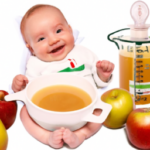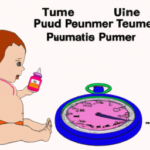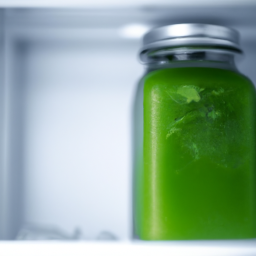For new parents, navigating the world of infant care can be daunting, especially when it comes to their digestive health. Constipation is a common issue for many babies, with up to 25% experiencing it at some point.
While there are many remedies available, prune juice is often recommended as a natural and effective solution. But how much prune juice is safe and effective for a constipated baby?
In this article, I will share my knowledge and experience on how much prune juice to give to a constipated baby. We will explore the benefits of prune juice, factors to consider before giving it, and how to prepare and serve it.
We will also delve into other natural remedies and long-term solutions to prevent constipation, as well as precautions and potential side effects to be aware of. As a parent myself, I understand the importance of finding safe and effective solutions for our little ones, and I hope this article will provide helpful guidance.
Key Takeaways
- Prune juice can be an effective solution for constipation in babies due to its sorbitol content and fiber-rich nature.
- The appropriate amount of prune juice to give a baby varies based on their age, weight, and severity of constipation, and should be determined by a healthcare provider.
- Prune juice should be diluted with water before serving to a baby, and adverse effects such as diarrhea, cramping, or gas should be monitored.
- If constipation persists despite using prune juice or other natural remedies, it may be necessary to seek guidance from a healthcare professional.
Understanding Constipation in Babies
You may notice your baby straining and crying while trying to poop, which can be a sign of constipation. Constipation is a common condition in babies, and it refers to infrequent bowel movements and difficulty passing stools. It can be caused by a variety of factors, including a change in diet, dehydration, and certain medications. However, in some cases, there may be an underlying medical condition that requires attention.
Fortunately, there are several prevention strategies that can help relieve and prevent constipation in babies. One of the most effective ways is to ensure that your baby is getting enough fluids, such as breast milk or formula. Additionally, incorporating high-fiber foods into their diet, such as fruits and vegetables, can help promote regular bowel movements. If your baby is already experiencing constipation, gently massaging their tummy or giving them a warm bath can also help.
Now, let’s talk about the benefits of prune juice and how it can help alleviate constipation in babies.
The Benefits of Prune Juice
Sipping on this sweet nectar may help relieve discomfort in tiny tummies. Prune juice is a natural laxative that can help soften stools and make bowel movements easier for babies. Here are some benefits of prune juice for constipation in babies:
-
Prune juice contains sorbitol, a natural sugar alcohol that helps draw water into the intestines and promotes bowel movement.
-
It is rich in fiber, which helps bulk up the stool and move it through the digestive system.
-
Prune juice is a good source of vitamins and minerals, such as vitamin C, potassium, and iron, which can benefit overall health.
-
It is a natural and safe alternative to over-the-counter laxatives or medications.
-
There are many prune juice recipes available, making it easy to incorporate into a baby’s diet.
If your baby doesn’t like the taste of prune juice or if you prefer to try alternative remedies, there are other options to consider. Some alternatives to prune juice include pear juice, apple juice, and pureed prunes. These options may also provide relief for constipation and can be introduced gradually into your baby’s diet.
When considering giving prune juice to your baby, there are some factors to consider. Let’s explore these in the next section.
Factors to Consider Before Giving Prune Juice
Before giving prune juice to my baby for constipation, I need to consider two important factors:
- My baby’s age and weight
- The severity of their constipation
As a responsible parent, I understand that babies under 6 months old shouldn’t be given prune juice. Additionally, it’s important to determine the appropriate amount of prune juice based on my baby’s weight and the severity of their constipation.
By taking these factors into account, I can ensure that I’m providing the safest and most effective treatment for my baby’s constipation.
Age and Weight of Baby
As your baby grows and gains weight, their digestive system develops and may require different amounts of prune juice to alleviate constipation. It’s important to consider the age and weight of your baby before administering any laxative, including prune juice.
For instance, a newborn baby who’s less than four weeks old shouldn’t be given prune juice as they’re still transitioning from a liquid to a solid diet. Babies who are between four weeks and six months old can be given prune juice, but only in small amounts. A good starting point is half an ounce of prune juice diluted with an equal amount of water. However, it’s important to consult with your pediatrician before administering any laxative to your baby.
Another factor to consider is the weight of your baby. A baby who weighs less than 6 pounds shouldn’t be given prune juice as they require a different dosage compared to a baby who weighs more than 6 pounds.
For instance, a baby who weighs between 6 and 12 pounds should be given an ounce of prune juice diluted with an equal amount of water. However, a baby who weighs more than 12 pounds can be given up to 2 ounces of prune juice per day, but only if recommended by a pediatrician.
Remember to always monitor your baby’s bowel movements and speak to your pediatrician if you notice any changes or worsening of symptoms. In the next section, we’ll discuss the severity of constipation and how it affects the amount of prune juice to give to your baby.
Severity of Constipation
The severity of constipation in your little one can greatly affect the amount of prune juice needed to provide relief. Factors such as the frequency and consistency of bowel movements, as well as the amount of discomfort the baby is experiencing, can all play a role in determining the appropriate dosage.
To better understand the relationship between severity of constipation and prune juice dosage, refer to the table below. It outlines the causes, remedies, prevention, and treatment options for different levels of constipation. Remember to consult with your pediatrician before administering any remedies or treatments, as they can provide personalized advice based on your baby’s unique needs.
| Severity of Constipation | Causes | Remedies | Prevention | Treatment |
|---|---|---|---|---|
| Mild | Dietary changes, dehydration | Increase fluids and fiber, massage baby’s tummy | Ensure baby is well hydrated, provide high-fiber foods | Over-the-counter stool softeners |
| Moderate | Medications, underlying medical conditions | Increase fluids and fiber, massage baby’s tummy, use suppositories | Ensure baby is well hydrated, provide high-fiber foods, monitor medication use | Consult with pediatrician for personalized treatment plan |
| Severe | Blockages, nerve or muscle damage | Seek medical attention immediately | Ensure baby is well hydrated, provide high-fiber foods, monitor medication use, avoid constipating foods | Medical intervention, such as enemas or surgery, may be necessary |
It’s important to note that while prune juice is a natural and effective remedy for constipation, it should be used in moderation and under the guidance of a healthcare provider. In the next section, we will discuss how to determine the appropriate amount of prune juice to give your little one.
How Much Prune Juice to Give
To ensure your baby’s comfort, it’s important to know how much prune juice to give for constipation relief. While prune juice is a popular and effective remedy for constipation, it’s important to remember that there are alternatives to prune juice that you can consider.
For instance, you can try giving your baby pear or apple juice, both of which are also known to promote bowel movement. However, if you decide to give your baby prune juice, it’s recommended that you dilute it with water before serving.
This is because prune juice contains a high amount of sugar which can be harmful to your baby’s health if consumed in large amounts. Start by mixing one ounce of prune juice with one ounce of water and observe how your baby’s body reacts.
It’s important to remember that every baby is different and may require more or less depending on their individual needs. With a little experimentation, you’ll soon find the perfect amount that works for your baby.
In the next section, we’ll discuss how to prepare and serve prune juice to your baby.
How to Prepare and Serve Prune Juice
Now that we know how much prune juice to give our constipated baby, let’s talk about how to prepare and serve it.
First, it’s important to note that there are alternatives to prune juice if your baby doesn’t like the taste or if you prefer to explore other options. You can try pear or apple juice, which also contain sorbitol, a natural laxative. However, keep in mind that these juices are not as effective as prune juice when it comes to relieving constipation.
When preparing prune juice for your baby, dilute it with an equal amount of water to make it easier to drink. It’s best to serve it at room temperature or slightly warmed, as cold drinks may cause stomach discomfort. You can offer prune juice to your baby once a day, preferably in the morning, to help regulate bowel movements. It’s important to monitor your baby’s reaction to prune juice and adjust the amount as needed.
Moving on to other natural remedies for constipation, there are several options that you can try in addition to prune juice.
These include increasing fiber intake, massaging your baby’s tummy, and giving a warm bath.
Let’s explore these options in more detail.
Other Natural Remedies for Constipation
If your little one is feeling backed up, there are a variety of natural remedies that can help get things moving. Some herbal remedies like chamomile, fennel, and ginger tea can help soothe the digestive system and promote bowel movements. However, it’s important to note that some herbs may not be safe for babies and should only be used under the guidance of a healthcare provider.
Another effective way to relieve constipation is by making dietary changes. Offer more high-fiber foods like fruits, vegetables, and whole grains to help soften stools and promote regularity. It’s also important to make sure your baby is getting enough fluids, as dehydration can worsen constipation.
If natural remedies and dietary changes don’t provide relief, talk to your pediatrician about other options.
As with any treatment, it’s important to be aware of potential precautions and side effects. In the next section, we will discuss some things to keep in mind when using prune juice as a remedy for constipation in babies.
Precautions and Potential Side Effects
As a caregiver, it’s crucial to monitor your baby’s reaction when introducing new remedies for constipation, including prune juice. Some babies may experience adverse effects such as diarrhea, cramping, or gas.
It’s also essential to be mindful of the risk of overdose, as too much prune juice can lead to further digestive issues. Therefore, it’s important to follow recommended dosage guidelines and consult with a healthcare provider before giving your baby prune juice or any other natural remedies.
Monitoring Baby’s Reaction
You’ll love watching your baby’s reaction as they enjoy a small amount of prune juice to help ease their constipation. It’s important to monitor their response to the juice to ensure that it’s helping their digestive system without causing any discomfort or adverse effects.
Here are three things to keep in mind while monitoring your baby’s reaction to prune juice:
-
Check their appetite: After giving your baby prune juice, keep an eye on their appetite. If they’re still eating and drinking normally, this is a good sign that the juice isn’t causing any discomfort. If they refuse to eat or drink, it may be a sign that the prune juice is causing stomach upset.
-
Observe their diaper changes: One of the most obvious signs that prune juice is working is a change in your baby’s bowel movements. If your baby has a bowel movement within a few hours of drinking prune juice, this is a positive sign that the juice is helping to relieve their constipation.
-
Take note of any adverse effects: While prune juice is generally safe for babies, there’s a risk of overdosing. If you notice any adverse effects such as diarrhea, vomiting, or stomach pain, stop giving your baby prune juice immediately.
It’s important to monitor your baby’s reaction to prune juice to ensure that it’s helping their constipation without causing any discomfort or adverse effects. In the next section, we’ll discuss the risks of overdosing and how to avoid them.
Risks of Overdose
Monitoring the amount of prune juice given to infants is necessary to prevent adverse effects and potential overdose. Overdosing on prune juice can cause diarrhea, stomach cramps, and dehydration. It can also lead to electrolyte imbalances, which can be dangerous for babies.
If these symptoms occur, it’s important to stop giving prune juice to the baby and provide plenty of fluids to prevent dehydration. In addition, it’s crucial to be aware of any medication interactions with prune juice. Certain medications, such as those for heart disease or high blood pressure, can interact negatively with prune juice and lead to adverse effects.
Consulting with a healthcare professional before giving prune juice to a baby can help prevent any potential risks or complications. Knowing the appropriate amount to give and monitoring for adverse effects can ensure the baby’s safety and prevent any potential overdose.
When to Consult a Healthcare Professional
If your baby’s constipation persists despite trying prune juice, it may be time to seek guidance from a healthcare professional. They can provide further insight and guidance on the matter. Depending on your location, you may have various healthcare provider options, such as pediatricians or family doctors.
It’s important to note that the frequency of consultation may vary depending on the severity and duration of your baby’s constipation. During your consultation, your healthcare provider may recommend different methods to relieve your baby’s constipation, such as adjusting their diet or prescribing medication.
It’s essential to follow their advice closely and communicate any concerns or questions you may have. By doing so, you can ensure that you are providing your baby with the best possible care to address their constipation. With the proper guidance and care, you can help prevent future bouts of constipation and promote your baby’s overall health and well-being.
Long-Term Solutions to Prevent Constipation
Incorporating fiber-rich foods into your child’s diet, such as whole grains, fruits, and vegetables, can help promote regular bowel movements and prevent constipation in the long-term. As a parent, it’s important to understand that preventive measures are key in managing constipation in babies.
Aside from fiber-rich foods, ensuring that your child is adequately hydrated is also important in promoting regular bowel movements. This means offering water in between meals, especially during hot weather or when your child is physically active.
Dietary changes are not the only solution to preventing constipation in the long-term. Encouraging your baby to engage in physical activity can also help promote regular bowel movements. This can involve simple activities such as crawling, walking, or playing with toys that encourage movement.
Additionally, it’s important to establish a regular bowel routine for your child, such as setting aside time for bowel movements after meals. With these preventive measures in place, you can help your child maintain regular bowel movements and reduce the likelihood of constipation in the future.
Frequently Asked Questions
Can prune juice be harmful to babies if given in excess?
Just like how too much sun can harm our skin, too much prune juice can harm a baby’s delicate digestive system. Some alternative ways to relieve constipation in babies include increasing water intake and adding fiber-rich foods to their diet.
Are there any age restrictions for giving prune juice to babies?
Prune juice can be beneficial for a baby’s digestive health, but it is important to consult with a pediatrician first. There are no age restrictions for giving prune juice, but it is recommended to give it in small amounts and at the best time of day for the baby’s routine.
How long does it take for prune juice to work for constipation in babies?
Prune juice effectiveness varies among babies, typically taking 6-8 hours to work. Dosage for babies is 1-2 ounces per day. Alternatives to prune juice for baby constipation include water, apple juice, and high-fiber foods. As a healthcare professional, I understand the frustration of constipation in babies and am here to provide guidance and support.
Can prune juice be mixed with other liquids or foods for babies?
Mixing prune juice with other liquids or foods for babies is a common practice. However, it’s essential to avoid sugary or caffeinated drinks. While it can provide relief from constipation, excessive intake can lead to diarrhea.
Is it safe to give prune juice to a baby who is already on medication for constipation?
Before giving prune juice to a baby on medication for constipation, consult with a pediatrician. Prune juice dosage may interact with medication. Alternative remedies such as dietary changes and gentle exercise can also help relieve constipation.
Conclusion
In conclusion, as a caregiver, it can be difficult to see your little one suffer from constipation. However, prune juice can be a helpful and natural solution to alleviate their discomfort.
It’s important to remember that while prune juice can be effective, it should only be given in moderation and after consulting with a healthcare professional. It’s also crucial to consider other factors like diet and hydration to prevent constipation from occurring in the first place.
While there are other natural remedies available, such as increased fiber intake and massage, prune juice can be a quick and effective solution. However, it’s important to approach this remedy with caution and to always prioritize the health and well-being of your baby.
By taking a proactive approach to your baby’s digestive health, you can help them feel more comfortable and happy.
Ilana has been a vegan for over 10 years. She originally made the switch for health reasons, but soon found herself becoming more and more passionate about the ethical and environmental implications of a vegan lifestyle. Ilana is the author of The Graceful Kitchen, a blog all about veganism. She loves to cook up delicious and nutritious vegan meals, and share her recipes with others who are interested in leading a cruelty-free life. Ilana is also a strong advocate for using whole foods as the foundation of a healthy diet, and believes that going vegan is one of the best ways to achieve this.
















